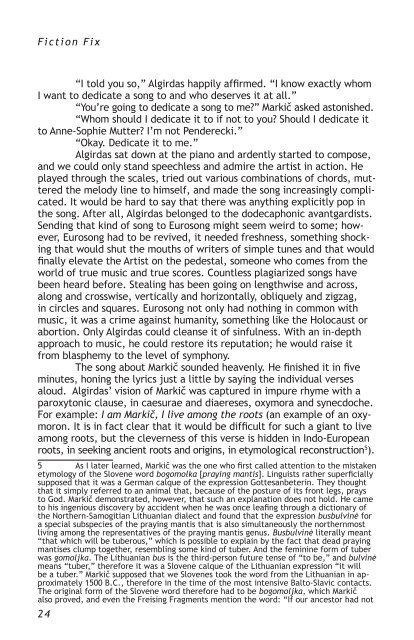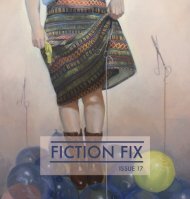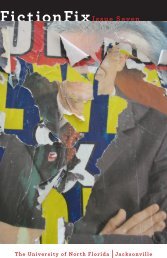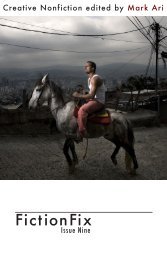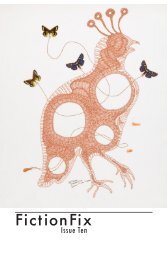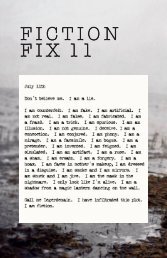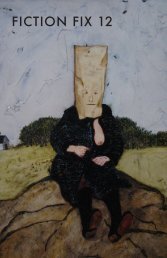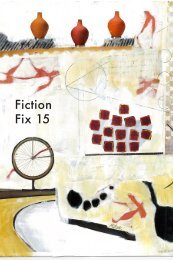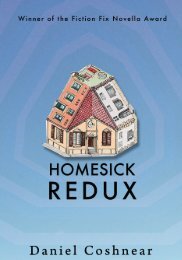Fiction Fix Six
You also want an ePaper? Increase the reach of your titles
YUMPU automatically turns print PDFs into web optimized ePapers that Google loves.
<strong>Fiction</strong> <strong>Fix</strong><br />
“I told you so,” Algirdas happily affirmed. “I know exactly whom<br />
I want to dedicate a song to and who deserves it at all.”<br />
“You’re going to dedicate a song to me?” Markič asked astonished.<br />
“Whom should I dedicate it to if not to you? Should I dedicate it<br />
to Anne-Sophie Mutter? I’m not Penderecki.”<br />
“Okay. Dedicate it to me.”<br />
Algirdas sat down at the piano and ardently started to compose,<br />
and we could only stand speechless and admire the artist in action. He<br />
played through the scales, tried out various combinations of chords, muttered<br />
the melody line to himself, and made the song increasingly complicated.<br />
It would be hard to say that there was anything explicitly pop in<br />
the song. After all, Algirdas belonged to the dodecaphonic avantgardists.<br />
Sending that kind of song to Eurosong might seem weird to some; however,<br />
Eurosong had to be revived, it needed freshness, something shocking<br />
that would shut the mouths of writers of simple tunes and that would<br />
finally elevate the Artist on the pedestal, someone who comes from the<br />
world of true music and true scores. Countless plagiarized songs have<br />
been heard before. Stealing has been going on lengthwise and across,<br />
along and crosswise, vertically and horizontally, obliquely and zigzag,<br />
in circles and squares. Eurosong not only had nothing in common with<br />
music, it was a crime against humanity, something like the Holocaust or<br />
abortion. Only Algirdas could cleanse it of sinfulness. With an in-depth<br />
approach to music, he could restore its reputation; he would raise it<br />
from blasphemy to the level of symphony.<br />
The song about Markič sounded heavenly. He finished it in five<br />
minutes, honing the lyrics just a little by saying the individual verses<br />
aloud. Algirdas’ vision of Markič was captured in impure rhyme with a<br />
paroxytonic clause, in caesurae and diaereses, oxymora and synecdoche.<br />
For example: I am Markič, I live among the roots (an example of an oxymoron.<br />
It is in fact clear that it would be difficult for such a giant to live<br />
among roots, but the cleverness of this verse is hidden in Indo-European<br />
roots, in seeking ancient roots and origins, in etymological reconstruction 5 ).<br />
5 As I later learned, Markič was the one who first called attention to the mistaken<br />
etymology of the Slovene word bogomolka [praying mantis]. Linguists rather superficially<br />
supposed that it was a German calque of the expression Gottesanbeterin. They thought<br />
that it simply referred to an animal that, because of the posture of its front legs, prays<br />
to God. Markič demonstrated, however, that such an explanation does not hold. He came<br />
to his ingenious discovery by accident when he was once leafing through a dictionary of<br />
the Northern-Samogitian Lithuanian dialect and found that the expression busbulvinė for<br />
a special subspecies of the praying mantis that is also simultaneously the northernmost<br />
living among the representatives of the praying mantis genus. Busbulvinė literally meant<br />
“that which will be tuberous,” which is possible to explain by the fact that dead praying<br />
mantises clump together, resembling some kind of tuber. And the feminine form of tuber<br />
was gomoljka. The Lithuanian bus is the third-person future tense of “to be,” and bulvinė<br />
means “tuber,” therefore it was a Slovene calque of the Lithuanian expression “it will<br />
be a tuber.” Markič supposed that we Slovenes took the word from the Lithuanian in approximately<br />
1500 B.C., therefore in the time of the most intensive Balto-Slavic contacts.<br />
The original form of the Slovene word therefore had to be bogomoljka, which Markič<br />
also proved, and even the Freising Fragments mention the word: “If our ancestor had not<br />
24


